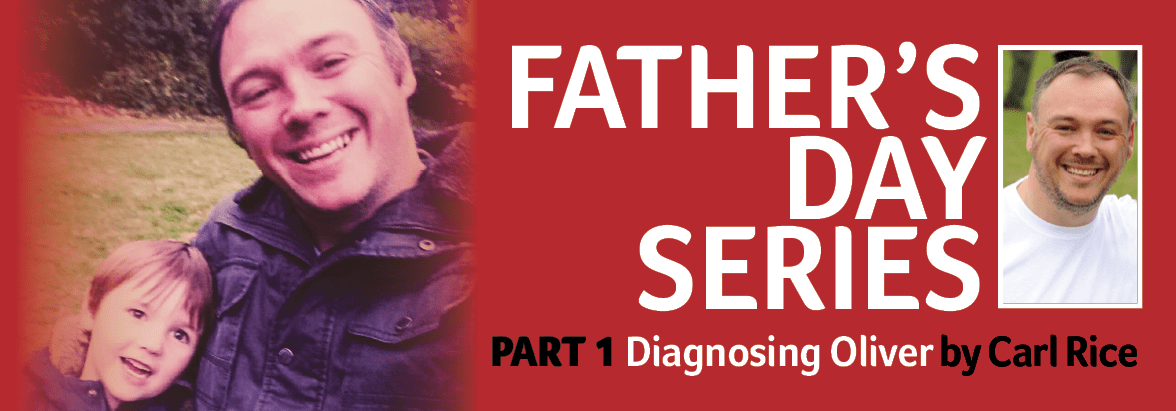
Diagnosing Oliver
By Carl Rice
Oliver, now six, is a man of few words, although he is now starting to use words to communicate.
We will never forget his first words. One Christmas night Hannah and I were watching TV. Oliver had sneaked downstairs without us being aware and he repeated the very first words he heard on the TV. We happened to be watching ‘Shaun of the Dead’. So Oliver’s first words were, “Just calm the f*** down!”
First we felt jubilation that he’d spoken – then, immediately, we were terrified that he’d repeat this phrase at nursery the next day.
Life with Oliver has always been eventful. It’s involved bad dancing, Xbox controllers taking a dip in the bath and random singing at 3am. Our story starts, though, with Oliver’s diagnosis.
Oliver was just under four when he received his official diagnosis. We had already accessed speech and language therapy before diagnosis and had some paediatrician appointments before Oliver had reached three. After a bit of trial and error we found a wonderful local nursery which had the most inspirational team of leaders and teaching staff. The SENCO was amazing and ensured that all of the appropriate professionals were involved and Oliver had 1-2-1 support with someone he loved.
We met with someone from paediatrics and were told Oliver was delayed but would catch up. Initially this was music to our ears, but as time went on we became more and more concerned that he would never catch up. He’d missed far too many milestones verbally and socially.
Eventually the paediatrician went out to the nursery specifically to observe Oliver and practically diagnosed him there and then – it was that obvious! I received the news via a telephone call. Despite knowing deep down that he was autistic, it was still hard to swallow.
We have had to fight for everything for Oliver, which is scandalous as he is severely disabled. Oliver was initially put down for an inappropriate school following the drawing up of his EHCP (Education and Health Care Plan). No-one had represented him at his appeal, and, since his report read well, they had Oliver down as someone who may thrive in a base in a mainstream school. That’s the problem with the whole process: you like to focus on the positive things and strengths and it is difficult to think about areas where someone may not be as strong or areas where our children may be significantly behind neuro-typical peers. It is important to give warts and all on any report that goes on record to help apply for any service or education as you may not be able to give the full story otherwise. Luckily our annoying tenacity got us the school placement appropriate for Oliver.
We applied for DLA (Disability Living Allowance) and were turned down at every stage. I have no hesitation in stating the Department of Work and Pensions cherry picked information to make Oliver sound a lot more able than he is, they took comments out of context to reach a decision, ignored other compelling statements and pieces of evidence and basically said, ‘he is doing well and improving all the time, who knows where he will be in a few years’ time’.
My wife and I represented Oliver ourselves at a tribunal and won. Representing yourself isn’t something I would recommend for everyone. It involved countless hours of research. We looked at the DWP decision making criteria, all of Oliver’s reports and case law. The tribunal lost vital pieces of information which would have caused us to lose our appeal had we not had our own copies. You need to be confident and assertive – it is really difficult not to be intimidated in the tribunal.
It shouldn’t be like this, you shouldn’t have to fight. But you must do so – and with all your might!
